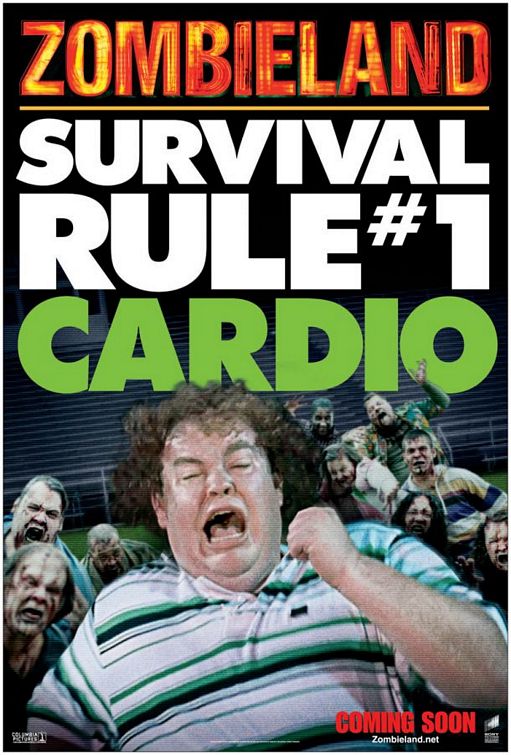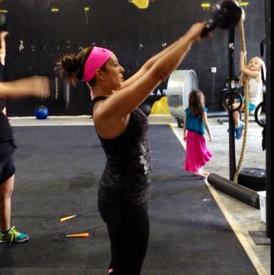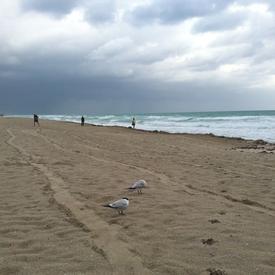"Running isn't good for you"
Replies
-
We may have been designed to run, but we weren't designed to run on pavement and we weren't designed to wear shoes with 1" soles. Knee problems are usually due to heel-striking.
Knee problems can arise for many reasons: earlier sports injuries, arthritis, loose ligaments, underdeveloped leg muscles and more.
But those reasons are not generally running itself. Research shows that knee problems related to running actually arise from poorly treated or untreated injuries, genetic tendency toward knee issues, and yes, poor form. Running itself is actually shown to increase joint strength and flexibility. A study of elite marathoners showed that they were no more likely to develop running problems than anyone else, and that people who didn't run were even potentially more likely to have knee, hip, or ankle problems later.
I have bursitis in my hips. Running has made them stronger so that they're not as painful, and it's made the joint stronger so I don't have the loose joint problems I did before.0 -
While there are some posters here who say that running caused knee them issues, in most cases it is an improper approach to running that causes problems. Some people have genetic issues or other predispositions to injury, but most people can run safely and enjoy tremendous cardio-vascular and muscular-skeletal benefits. Too many people try it and give up due to a poor approach. Too much too fast is a big one. Many people increase their distance and/or speed without proper build up which puts too much pressure on the entire muscular/skeletal system resulting in pain or injury. I did this myself; I was just too impatient to build up slowly. It also pays to do some good lower body strength training to prepare the legs for additional stress. And I have read that cycling and running are perfect compliments to one another; each strengthens a part of the leg that the other uses but does not strengthen. So I run and cycle on alternating days. Others swim and run. Triathlon training is a great way to mix things up. Warming up, cooling down, and stretching are other crucial pieces. So, running with inadequate preparation and/or poor technique can cause knee issues, but for most people this can be avoided and the benefits of running are extensive.
I don't disagree with anything you say, but I have to pull back a little in the opposite direction. Running is, by definition, a high-impact activity. Running DOES have a higher risk of injury associated with it than lower-impact exercises. While running does not cause long-term joint damage, it does beat your legs up pretty good. Running will expose any muscle imbalances or biomechanical shortcomings that you have, and since the average person is not born with perfect biomechnanics, most runners will experience some type of injury if they run long enough (years, not length of run).
The risks of running can be mitigated by appropriate shoes, stretching, strengthening, training, etc, but they are there. The fitness and health benefits of running are also substantial, along with the enjoyment of running itself. In my opinion, the benefits overall outweigh the risks. But, to be honest, the risks are there, even if you do everything "right". I would never tell a healthy person they should not run, but I think it is important to understand that it is not an inherently benign activity either.0 -
Here's all you need to know.
Zombies don't care if running is bad for your knees. The fact that you can burn a similar amount of calories walking will not save you from having your flesh chewed up.
Sometimes in life, you just gotta RUN!
HAHAAAAA......Thanks for the laugh!!! THAT is hilarious and i will remember this when I want a walk break!!! :laugh:0 -
I am so sick and tired of hearing this crap! People dont want you to be successful at anything....I'm 39, will be 40 in September...I took up running and am training for my first half marathon in May. After telling someone that I had run 10 miles, they had the audacity to say, "You'll lose your boobs if you run too much." I couldnt believe what I was hearing! I tell them about my success and all I hear is negativity!
All that said, take the necessary precautions to ensure that you are taking care of yourself while running and you'll be fine...don't let anyone drag you down! Make sure to go to an actual running store and get fitted for the right shoe. Make sure if you start feeling pain in your knees, to replace your shoes!
Go for it girl!Dont listen to the negativity!!!0 -
I hated hearing that when I was training for a marathon. I started out close to 200lbs and it was hell on my knees, but as I lost weight it got easier. Keep YOUR goals in mind and keep it up. Don't let someone other than your doctor tell you what's good for your body.
Although I love this quote from a college friend of my husband's "you can't do just one exercise, it makes your butt look weird. Change it up a bit."0 -
I've heard the same thing. I've also heard that walking burns more calories...what?
Running is hard on your joints (knees mostly) but with proper foot support, it shouldn't be too much of a problem. I'm friends with a lot of athletes (tri-athletes actually) and NONE of them have had major problems with their knees from running. Personally, I think it makes sense that the more you run, the more you strengthen those joints, because you use them more.
Being overweight is also hard on your joints. And your organs, and your muscles, and your life....I'll take sore knees over heart disease any day.0 -
I hear that all the time, I used to have a lot of pain in my knees, and the were crunchy sounding when I moved them, Now I'm a runner, and I do take glucosamine, but I rarely have pain in my knees now, and they now move smoothly. I'd say do what works for you!
Also, I got fitted for the right kind of shoes at a good running store, That changed my world as far as running goes!0 -
Anecdotally, I know a bunch of runners who have been running for years. All of them always run at low intensities and don't run at exceedingly high volumes (ie. they follow novice Hal Higdon training programs), and most of them keep getting injured. The one common denominator is they all get shoes based on the recommendations of the running stores and they pay no attention to their stride. I on the other hand have never been gait tested, I only wear racing flats (ie. my pic), and I do mostly high intensity running and have had minimal injuries over the years.
The worst decision I've ever made was walking into one of those running stores. It took me 6 months fully heal from those 2 pair of shoes. all that new awesome technology in shoes tore my shins and ankles up. I wear the lowest profile shoe I can find with an insole. When in doubt I take them home and go a half mile out and a half mile back, I've returned more shoes over the past 3 years, but I haven't been injured since.
It's unfortunate that you had this experience. The local store that I refer people to is fantastic. Everyone there is trained in gait analysis. They make recommendations based on your mileage, experience and gait. It sounds to me like you were just sold a piece of technology, as opposed to a solution.
Ditto! The people at my running store are fantastic and extremely knowledgeable! I've had nothing but success with every shoe they've recommended for me, and they've never pushed some fancy shmancy technology on me. Just like personal trainers, doctors, everything, there are bad ones out there and good ones out there that know what they're talking about.0 -
call it left-wing propaganda, but this story on NPR tells a different tale http://www.npr.org/2011/03/28/134861448/put-those-shoes-on-running-wont-kill-your-knees0
-
If people are running to train up their endurance for 5k's, 10k's, or whatever marathon they want to do...that's one thing. But alot of times people run because for some reason they think it's the "end all, be all" thing to "fitness". Their diets are trash. They have no clue about energy balance, but they run run run run thinking the fat will magically fat off.
That is what is comical.
Not to mention that I don't think I've seen a runner yet with amazing body composition.
I don't know what kind of amazing you're looking for, 75% bone?
If you're just looking for someone with low body fat % and visible abs, should be pretty easy to find.
I sure wouldn't mind looking like David Goggins....
http://www.runnersworld.com/article/0,7120,s6-243-560--12944-0,00.html
OK, he's pretty hot!0 -
I never read the studies but I "walk the walk".The knee risk is a risk to anyone who does anything with poor form, does too much too soon, or wears improper footwear. What is truly bad for our knees is not using them as they were intended--use it or lose it.
In studies of long-term runners vs. non-runners the runners actually had healthier knees. That running-is-bad-for-knees hogwash is simply popular urban myth.
I stopped playing basketball in college because of knee pain (commonly called "runner's knee"). had knee pain from 1979 to 2005 when, on the advice of a doctor, I tried glucosamine. I realize that gluc was found to be inconclusive in studies for RA but I had chondromalacia, not RA and it gave me relief of serious knee pain that I'd had for almost 30 years.
I started running in June, 2011 and by December, 2011 I had no knee pain. Miracle? Of course not, just that the running strengthened my legs to the point where my knee caps were "tracking " correctly and I am now pain free for the first time since 1979.
One of my brother's in law (to be) has told me, straight out, that running is bad for you. He's sure of this 'cause he's talked to lots of doctors who see patients all the time who have injured themselves running.
My response to him was simple - "If you knew lots of folks who owned (car) body repair shops, I'd bet you'd think that driving was really bad for you too, right?"
Jeff didn't answer that question. :-)
See y'all at the finish line!0 -
only for your knees, like 2939 probably just said above me. ;P0
-
From The Onion, so you know it is true:
http://www.theonion.com/articles/human-feet-originally-used-for-walking-anthropolog,3839/0 -
Here is the deal with those lame @$$ people that will tell you how bad running is for you, they tell you running is bad because they can’t run. That is why they condemn it, because they don't have the strength, endurance, or the commitment to do it. Running is hard because it is mostly about conditioning your head to keep yourself going. The body does what the mind tells it. If you tell it to keep going it will. ( I will chant to myself on longer runs when I am tired just keep running just keep running just keep running running running, like Dory from Finding Nemo) Running is mostly in your head and having the ability to push through even when your body doesn't want to, it is isn’t about running through the pain it is about running through the desire to stop. My two favorite running sayings are “the hardest part about going for a run is putting your shoes on” and “My sport is a punishment in your sport”. When you do your 5K bring your bib in to work hang it up at your desk and when that woman notices it gush on and on about how awesome it was to run that race and how accomplished you felt and how proud you are of yourself. Rub her nose in it without rubbing her nose in it. Accomplishing something that she can not is the best revenge.0
-
Here is the deal with those lame @$$ people that will tell you how bad running is for you, they tell you running is bad because they can’t run. That is why they condemn it, because they don't have the strength, endurance, or the commitment to do it. Running is hard because it is mostly about conditioning your head to keep yourself going. The body does what the mind tells it. If you tell it to keep going it will. ( I will chant to myself on longer runs when I am tired just keep running just keep running just keep running running running, like Dory from Finding Nemo) Running is mostly in your head and having the ability to push through even when your body doesn't want to, it is isn’t about running through the pain it is about running through the desire to stop. My two favorite running sayings are “the hardest part about going for a run is putting your shoes on” and “My sport is a punishment in your sport”. When you do your 5K bring your bib in to work hang it up at your desk and when that woman notices it gush on and on about how awesome it was to run that race and how accomplished you felt and how proud you are of yourself. Rub her nose in it without rubbing her nose in it. Accomplishing something that she can not is the best revenge.
she said the woman who made the comment was clearly a fit individual...i don't think that was really the case.0 -
Wow, I have never heard that. I know the potential impact on joints, but with proper form, every runner I know is in fabulous shape.0
-
Such a crock.....I've lost over 15 pounds and way more inches in my thighs and stomach by running over the last few months. Anything in excess isn't good for you. Running a 5k is an AMAZING sense of accomplishment.....some people are so negative. I'd have said to her if she has nothing nice or supportive to say about me bettering myself maybe she shouldn't say anything at all...some friend.0
-
Anecdotally, I know a bunch of runners who have been running for years. All of them always run at low intensities and don't run at exceedingly high volumes (ie. they follow novice Hal Higdon training programs), and most of them keep getting injured. The one common denominator is they all get shoes based on the recommendations of the running stores and they pay no attention to their stride. I on the other hand have never been gait tested, I only wear racing flats (ie. my pic), and I do mostly high intensity running and have had minimal injuries over the years.
The worst decision I've ever made was walking into one of those running stores. It took me 6 months fully heal from those 2 pair of shoes. all that new awesome technology in shoes tore my shins and ankles up. I wear the lowest profile shoe I can find with an insole. When in doubt I take them home and go a half mile out and a half mile back, I've returned more shoes over the past 3 years, but I haven't been injured since.
It's unfortunate that you had this experience. The local store that I refer people to is fantastic. Everyone there is trained in gait analysis. They make recommendations based on your mileage, experience and gait. It sounds to me like you were just sold a piece of technology, as opposed to a solution.
Yeah, the store came highly recommended, so I went. They watched me run and said "here, because you blah blah blah and have yadda yadda yadda you're a perfect match for either this pair of adidas or that pair of (can't remember if they were muzinos or asics). I said "at $100 a pop, I'll take both." (I rotate my kicks and don't wear them 2 days in a row) Whatever, I found a pair of puma's cheap at TJMaxx and decided to try them out and figured out I need a nice thin sole without any special stuff to "fix" blah blah blahs and yadda yadda yaddas.0 -
From The Onion, so you know it is true:
http://www.theonion.com/articles/human-feet-originally-used-for-walking-anthropolog,3839/
Love it :laugh:0 -
I think the OP just wanted a comeback for her conversation, and it became a debate..
Well, I was looking for a comeback...but you really need to fuel yourself with knowledge to order to come up with one.....so thanks so much for all of the responses and links! I have learned a lot!! Took a while to get through all of these comments in between tasks at work! Got a lot of good laughs too, and a good wake-up call realizing I need to bump up my training in case of a Zombie Apocalypse!
I came into C25K after a year of Zumba, so I think that helped a bit in strength. I haven't had knee pain yet, but my first week on C25K, I did make the mistake of attempting it in my Zumba shoes (Nike Musiques). Bad, bad, BAD decision! My shins and ankles were not happy with me at all. That weekend, I went to the sports store and with the help of a store associate, picked out a running shoe. However, they didn't carry my size so I ended up ordering the same shoe from Zappos (and saved a ton of money too!)
I've been running joint pain-free ever since. Just the normal hurt from muscles. I'm only running on a treadmill, mostly because of my being overweight, and I did want the extra cushioning. With C25K, I can get my workout in (and an great calorie burn) during the span of my lunch hour. (35 mins of workout/stretching and 25 mins of shower, changing clothes and hair repair!) Works great for me!
I have also started incorporating some strength training on my non-C25K days.
FWIW.. today, while I was struggling with the last few mins of my C25K run sequence, that super came in to the gym. She got on her treadmill with her iTablet (I think that's what it was...when she held it, it covered most of her arm...and proceded to send emails (one handed) while on her treadmill. I finished my cool down, did my stretching...My shirt was soaked! ....and she was still on the treadmill, walking and emailing away... ummm....yeah...not so much of a workout to me....
I'm doing the dreaded W5D3 on Friday..0 -
I can walk, do areobics of strength train all day but just a mile or two of running and I get a terrible migraine.0
-
I'm pretty sure humans ran for many thousands of years from lions and such. If we aren't designed to run, I don't know what we are designed to do.
If humans weren't designed to run, we would have been extinct a very long time ago.0 -
I think the OP just wanted a comeback for her conversation, and it became a debate..
Well, I was looking for a comeback...but you really need to fuel yourself with knowledge to order to come up with one.....so thanks so much for all of the responses and links! I have learned a lot!! Took a while to get through all of these comments in between tasks at work! Got a lot of good laughs too, and a good wake-up call realizing I need to bump up my training in case of a Zombie Apocalypse!
I came into C25K after a year of Zumba, so I think that helped a bit in strength. I haven't had knee pain yet, but my first week on C25K, I did make the mistake of attempting it in my Zumba shoes (Nike Musiques). Bad, bad, BAD decision! My shins and ankles were not happy with me at all. That weekend, I went to the sports store and with the help of a store associate, picked out a running shoe. However, they didn't carry my size so I ended up ordering the same shoe from Zappos (and saved a ton of money too!)
I've been running joint pain-free ever since. Just the normal hurt from muscles. I'm only running on a treadmill, mostly because of my being overweight, and I did want the extra cushioning. With C25K, I can get my workout in (and an great calorie burn) during the span of my lunch hour. (35 mins of workout/stretching and 25 mins of shower, changing clothes and hair repair!) Works great for me!
I have also started incorporating some strength training on my non-C25K days.
FWIW.. today, while I was struggling with the last few mins of my C25K run sequence, that super came in to the gym. She got on her treadmill with her iTablet (I think that's what it was...when she held it, it covered most of her arm...and proceded to send emails (one handed) while on her treadmill. I finished my cool down, did my stretching...My shirt was soaked! ....and she was still on the treadmill, walking and emailing away... ummm....yeah...not so much of a workout to me....
I'm doing the dreaded W5D3 on Friday..
Not sure if you developed any ideas for a snappy comeback, but I think in the end you got a lot of people "disproving" her hypothesis that running is bad for you.
Anyway, best of luck in your training, and come visit us in the "Ultimate 5K Runners" group on MFP:
http://www.myfitnesspal.com/groups/home/3386-ultimate-5k-runners
We would love to hear about your progress, help encourage you, gain encouragement from you, and hopefully develop our skills to avoid the Zombie Apocalypse. After all, RULE 1: CARDIO. 0
0 -
I heard it causes wrinkles on your face =(0
-
Eating isn't good -- if you eat the wrong foods.
Walking isn't good for you -- if you walk in front of a bus.
Lifting weights isn't good for you -- if you drop them on your foot.
Running is a natural function of the human body. If running is bad for you, how come there are SO many people 40+ years of age that are runners? When you go to your 5K race (because I know you will complete C25K and then run a race), look at the entries for 40+ and you will see it makes up a good portion of the race.
Granted, constant pounding can be rough on knees and hips, but who says you have to run on pavement 100% of the time? Change it up - run on a track - they are rubber or crushed gravel. Run on trails or in a field, or a treadmill (most have shock impact built in). Also, keep your stride low and somewhat short - it will cause you to strike less on the heel (this is what truly causes impactful damage) and will cause you to run more mid-foot strike which lessens the impact.
Also, those that say running is bad for you generally don't like running and think that the answer to everything is strength training. Don't get me wrong, I strength train in addition to my running, and it makes my body stronger which improves my running. The running improves my endurance and cardiovascular fitness.
Greg
This times 1000. :glasses:0 -
Calorie-wise, running and walking a mile burn roughly the same it just takes longer. But there is much less impact walking. Another retort could be that driving is bad for you too but we all do it.
Actually, that's incorrect, running burns twice as many net calories per mile as walking.
I do have agree with another poster though, if done incorrectly any activity can be bad for you0 -
OK...somebody help me out here! What's the name of the tribe in the lower americas in which they run hundreds of miles...just for fun. I think they would beg to differ that running is bad

**Edit: Found it...the Tarahumara.
First read about them in the book "Born To Run." Really interesting people.0 -
running is nothing but good for you. it's good for your body, good for your soul, good for your mind. sure, it causes a lot of wear & tear…I say all this as my knee and shin are both busted up from a long run…but if done properly, the body can handle it. running is natural. nothing makes me feel more connected to myself and to nature than running. I certainly don't get that feeling from walking. if done properly, with the correct training, the right amount of stretching…she is 100% wrong! running IS good for you!0
-
I think the OP just wanted a comeback for her conversation, and it became a debate..
I'm doing the dreaded W5D3 on Friday..
You're gonna rock it!!! Great job so far! I'm on week 8 and it still amazes me that I can run for 25 minutes at a time when just 2 months ago I could barely run for 60 second intervals. c25k is such a great program!0 -
I suck at quick retorts and comebacks....I usually come up with something good I could have said hours after the exchange....but this has still stumped me.....because one little part in the back of my brain actually believes what was said to me....
I was in the locker room at the gym we have here where I work. Two other coworkers and I were discussing workouts and I was explaining the C25K program I'm doing. The one coworker is actually a supervisor (not of me, directly - but I do have a high respect of her) looked at me and said, "You know, running isn't good for you. Walking at a fast pace is so much better."
Taken by surprise that this very fit woman would have that view, I just explained that it is my goal to one day run in a 5K, just so I could know that I did it! She walks away saying that it's going to kill my knees....
I had no reply..... thoughts?
What the hell would they know, they never run :laugh:
Do you enjoy running? Does it make you feel good? If so, continue running.0
This discussion has been closed.
Categories
- All Categories
- 1.4M Health, Wellness and Goals
- 398.5K Introduce Yourself
- 44.7K Getting Started
- 261K Health and Weight Loss
- 176.4K Food and Nutrition
- 47.7K Recipes
- 233K Fitness and Exercise
- 462 Sleep, Mindfulness and Overall Wellness
- 6.5K Goal: Maintaining Weight
- 8.7K Goal: Gaining Weight and Body Building
- 153.5K Motivation and Support
- 8.4K Challenges
- 1.4K Debate Club
- 96.5K Chit-Chat
- 2.6K Fun and Games
- 4.8K MyFitnessPal Information
- 18 News and Announcements
- 21 MyFitnessPal Academy
- 1.5K Feature Suggestions and Ideas
- 3.2K MyFitnessPal Tech Support Questions
























